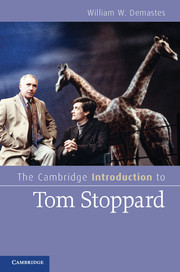Book contents
- Frontmatter
- Contents
- Illustrations
- Acknowledgements
- Introduction: Stoppardianism
- Professional chronology
- Chapter 1 Stoppard: briefly, a life in the theatre
- Chapter 2 Keys to Stoppard’s theatre
- Chapter 3 The breakthrough years
- Chapter 4 Playing with the stage
- Chapter 5 Science takes the stage
- Chapter 6 Love is in the air
- Chapter 7 Politics humanized
- Conclusion: The play’s the thing
- Appendix Stoppard’s theatre: a summary
- Notes
- Guide to further reading
- Index
Appendix - Stoppard’s theatre: a summary
Published online by Cambridge University Press: 05 December 2012
- Frontmatter
- Contents
- Illustrations
- Acknowledgements
- Introduction: Stoppardianism
- Professional chronology
- Chapter 1 Stoppard: briefly, a life in the theatre
- Chapter 2 Keys to Stoppard’s theatre
- Chapter 3 The breakthrough years
- Chapter 4 Playing with the stage
- Chapter 5 Science takes the stage
- Chapter 6 Love is in the air
- Chapter 7 Politics humanized
- Conclusion: The play’s the thing
- Appendix Stoppard’s theatre: a summary
- Notes
- Guide to further reading
- Index
Summary
But these are merely the facts.
The Invention of Love (95)The Gamblers was written in 1960 and given a single production at the Bristol Old Vic Theatre School by a Bristol University student group in 1965.
It is a play involving a condemned political prisoner and his jailer. By the end of their extended conversation the two men change roles, and the jailer goes to his death.
A Walk on the Water was written in 1960 and rewritten as a 90-minute television play (broadcast by Rediffusion, November 1963). As a translated work entitled Der Spleen des George Riley, it became Stoppard’s first fully staged play on June 30, 1964, in Hamburg, Germany. This work eventually became Enter a Free Man. See below.
The Dissolution of Dominic Boot. This 15-minute radio play was broadcast in a BBC series called Just Before Midnight, February 1964. Converted to a mini-film in 1969 called The Engagement, it aired on American television and in British cinemas in 1970.
A young man in a hired cab is forced to drive through the city to find enough money from friends and other sources to pay his cab fare. The more he looks the deeper in debt he becomes, until he is utterly destitute.
“M” is for Moon among Other Things. Originally a short story published in Introduction II: Stories by New Writers (London: Faber & Faber, 1962), this 15-minute radio play was broadcast in early 1964 in the BBC series Just Before Midnight.
A loveless middle-aged couple finds meaning in various ways: Alfred looks for sensational stories in the newspaper, musing about how he might have been able to save Marilyn Monroe (who died in 1962); Constance, obsessed with order and possessed of a good memory, is reading an encyclopedia purchased volume-to-volume on installment. She is currently reading volume M–N.
- Type
- Chapter
- Information
- The Cambridge Introduction to Tom Stoppard , pp. 138 - 147Publisher: Cambridge University PressPrint publication year: 2012



